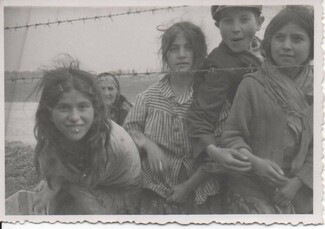The Gypsy Camp at Auschwitz - a poem by Raine Geoghegan

February 1943: At Auschwitz-Birkenau, a family Gypsy camp was set up in a wooden barracks. August 2 1944: Over 4,000 Roma and Sinti men, women and children were murdered in the gas chambers. January 27 1945 at 3pm, Soviet soldiers reached the camp and found only one Rom among the survivors.
The Gypsy Camp at Auschwitz
the branches on the trees bend and sway
leaves fall and settle on the ground
sunlight seeps through mottled clouds
and all is quiet
a woman with long red hair
picks a blade of grass
holds it up to the light
remembering her husband
the shape of his mouth
how he spoke her name, Narilla
men kek bissa: we will not forget
an old chal with silver hair
takes his hat off, feels the warmth of the sun
on his head
his chavo was four years old when they were imprisoned
a year later he was taken and was never seen again
he had dark curls and hazel eyes
a chavali runs into the arms of her mother
who remembers she once had twelve chavies
all had hair the colour of the darkest earth
and eyes like wolves
.
men kek bissa: we will not forget
winter birds mourning on the branches
the earth remembering
how it has given refuge to the dead
no longer dead leaves trampled underfoot
they have become wild breathing flowers
growing in the dust.
“Except for a few survivors, a whole people unique in its life-style, language, culture and art, was wiped off the face of the earth. The death of the Gypsy Nation was more than physical; it was total oblivion.” Azriel Eisenberg, Witness to the Holocaust, 1981 (New York) taken from Danger, Educated Gypsy, selected essays by Ian Hancock.
(Romani jib: Men kek bissa – we will not forget; Chal – man; Chavo – boy; Chavali – girl; Chavies – children).
Raine Geoghegan
To mark Holocaust Memorial Day, January 27th, 2019.
(Main photograph: Roma children during the Second World War. The photograph would have been taken by a German soldier somewhere in the Balkans around 1942-3. Outcome unknown. Picture courtesy and (c) Bob Dawson)